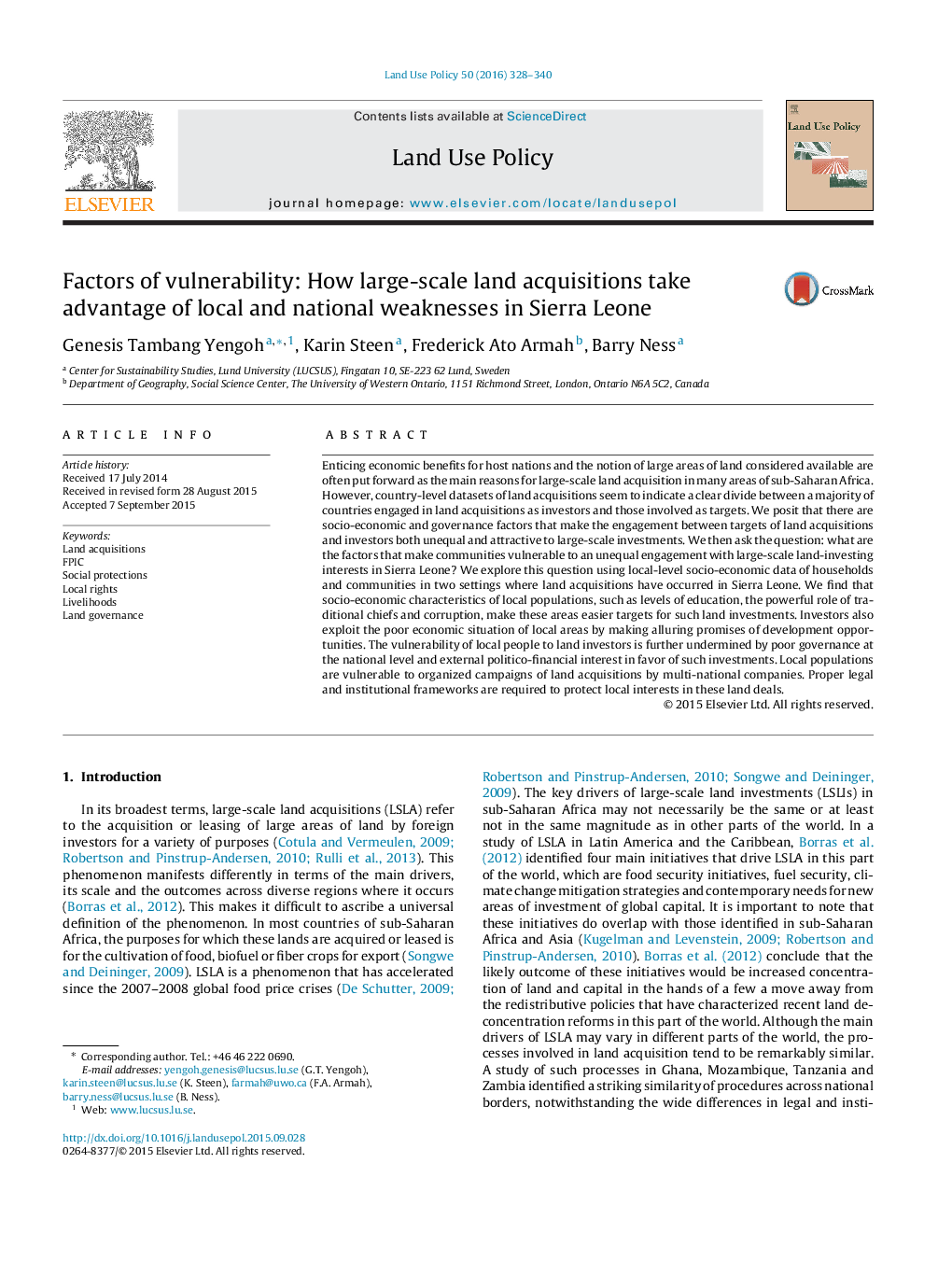| کد مقاله | کد نشریه | سال انتشار | مقاله انگلیسی | نسخه تمام متن |
|---|---|---|---|---|
| 6547647 | 160095 | 2016 | 13 صفحه PDF | دانلود رایگان |
عنوان انگلیسی مقاله ISI
Factors of vulnerability: How large-scale land acquisitions take advantage of local and national weaknesses in Sierra Leone
ترجمه فارسی عنوان
عوامل آسیب پذیری: چگونگی خرید زمین های بزرگ در نقاط ضعف محلی و ملی در سیرالئون
دانلود مقاله + سفارش ترجمه
دانلود مقاله ISI انگلیسی
رایگان برای ایرانیان
ترجمه چکیده
مزایای اقتصادی برای ملت های میزبان و مفهوم مناطق وسیعی از زمین های در نظر گرفته شده در دسترس اغلب به عنوان دلایل اصلی برای جذب زمین در مقیاس بزرگ در بسیاری از مناطق کشورهای جنوب صحرای آفریقا مطرح می شود. با این حال، مجموعه داده های سطح کشور در زمینه خرید زمین به نظر می رسد تقسیم واضح بین اکثریت کشورهائی که در زمینه خرید زمین به عنوان سرمایه گذاران و کسانی که به عنوان اهداف درگیر هستند، نشان می دهد. ما معتقدیم که عوامل اجتماعی-اقتصادی و حکمرانی وجود دارد که باعث تعامل بین اهداف خرید زمین و سرمایه گذاران نسبت به سرمایه گذاری در مقیاس بزرگ می شود. سپس پرسش را مطرح می کنیم: عوامل موثر بر جوامع آسیب پذیر در برابر نابرابری منافع سرمایه گذاری سرزمینی در سیرالئون چیست؟ ما این سوال را با استفاده از داده های اجتماعی-اقتصادی محلی در سطح خانوارها و جوامع در دو منطقه که در زمین های سیرالئون رخ داده است، بررسی می کنیم. ما دریافتیم که ویژگی های اجتماعی و اقتصادی جمعیت های محلی مانند سطوح آموزش، نقش قدرتمند روسای سنتی و فساد، این زمینه ها را برای اهداف چنین سرمایه گذاری های زمینی آسان تر می کند. سرمایه گذاران همچنین با ایجاد وعده های شگفت انگیز فرصت های توسعه از وضعیت اقتصادی ضعیف مناطق محلی بهره می برند. آسیب پذیری مردم محلی برای سرکوب سرمایه گذاران توسط حکومت ضعیف در سطح ملی و منافع سیاسی و مالی خارجی به نفع چنین سرمایه گذاری ها تضعیف می شود. جمعیت محلی آسیب پذیر هستند به کمپین های سازماندهی شده برای خرید زمین توسط شرکت های چند ملیتی. برای محافظت از منافع محلی در این قراردادهای زمین مورد نیاز سیستم های قانونی و سازمانی لازم است.
موضوعات مرتبط
علوم زیستی و بیوفناوری
علوم کشاورزی و بیولوژیک
جنگلداری
چکیده انگلیسی
Enticing economic benefits for host nations and the notion of large areas of land considered available are often put forward as the main reasons for large-scale land acquisition in many areas of sub-Saharan Africa. However, country-level datasets of land acquisitions seem to indicate a clear divide between a majority of countries engaged in land acquisitions as investors and those involved as targets. We posit that there are socio-economic and governance factors that make the engagement between targets of land acquisitions and investors both unequal and attractive to large-scale investments. We then ask the question: what are the factors that make communities vulnerable to an unequal engagement with large-scale land-investing interests in Sierra Leone? We explore this question using local-level socio-economic data of households and communities in two settings where land acquisitions have occurred in Sierra Leone. We find that socio-economic characteristics of local populations, such as levels of education, the powerful role of traditional chiefs and corruption, make these areas easier targets for such land investments. Investors also exploit the poor economic situation of local areas by making alluring promises of development opportunities. The vulnerability of local people to land investors is further undermined by poor governance at the national level and external politico-financial interest in favor of such investments. Local populations are vulnerable to organized campaigns of land acquisitions by multi-national companies. Proper legal and institutional frameworks are required to protect local interests in these land deals.
ناشر
Database: Elsevier - ScienceDirect (ساینس دایرکت)
Journal: Land Use Policy - Volume 50, January 2016, Pages 328-340
Journal: Land Use Policy - Volume 50, January 2016, Pages 328-340
نویسندگان
Genesis Tambang Yengoh, Karin Steen, Frederick Ato Armah, Barry Ness,
